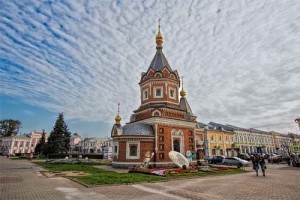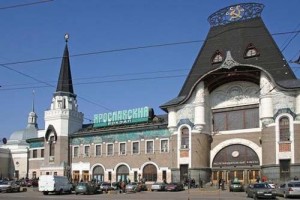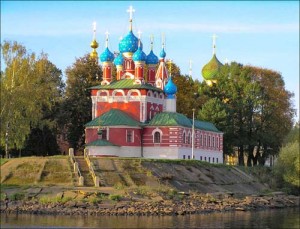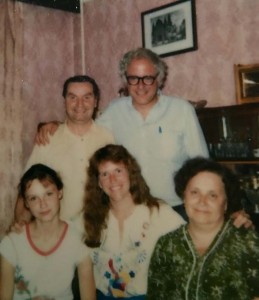When Bernie Sanders honeymooned in the Soviet Union in 1988, Andrei Sakharov had already been released from internal exile, Refusniks were allowed to leave the country, the press were discussing the legacy of Stalinism and the state was allowing elements of the free market to take hold.
The country was in the midst of perestroika, which generated excitement both in the Soviet Union and abroad.
Many foreigners came to visit, among them my future brother-in-law, (more about that later) and we were clamoring to meet them, Americans especially. And sure, it was still the Soviet Union and the GULAGS were still functioning, but without a doubt, things were going in the right direction. I don’t fault the then-Burlington mayor for visiting USSR, it’s his ego, his intent and his conclusions that I find problematic.
Sanders took his new bride on a trip to Yaroslavl, a historic city on the Golden Ring of Russia, a region known for the quiet exotic charm of onion-domed churches and ornate wooden cottages. Avert your eyes from the glib Soviet projects –and you got yourself a perfect backdrop for a radical chic honeymoon circa 1988.
Bernie played up the radical chic aspect in his book boasting of “a very strange honeymoon”.
Strange it was because, lets face it, not all newlyweds surround themselves with an entourage of 10, hob-nob with provincial nomenclatura and tour Lenin’s tomb.
[This is Yaroslavl, a gem on the poignantly dubbed Golden Ring of Russia, touted as a premier destination for newlyweds.]
Sanders went to set up a sister city program to facilitate a cultural exchange between Burlington and Yaroslavl, not a bad thing in and of itself. Sister-city programs between American and Soviet towns proliferated at that time, but in Bernie’s mind Burlington’s was imbued with special significance:
A number of cities have nice waterfronts, good streets, honest police departments, and even minor league baseball,” Sanders wrote in his memoir. “But how many cities of 10,000 have foreign policy? Well, we did.
[…]
Burlington had a foreign policy because, as progressives, we understood that we all live in one world.
Although the free spirit from Vermont fancied his “foreign policy” to be some sort of an antidote to the warmongering Reagan, his Yaroslavl partnership came on the coattails of the 40th president who ushered in the friendliest relationship we ever had with Russia.
If the mayor’s guided tour of Russia was some kind of foreign policy exercise, I feel a bit let down because, as far as I can tell, Bernie didn’t utter a word about freedom. We in the Soviet Union were taking steps towards liberalization, and not a word of encouragement from this American official?
Very little is published about his Yaroslavl honeymoon in English, and all information I can find in Russian is translations of American materials. Russian media doesn’t pay much attention to American elections at this early stage, and, in as much as they do, they prefer populist Trump to socialist Sanders.
An interview Sanders took from the mayor of Yaroslavl Alexander Ryabkov while aboard a boat sailing the Volga river offers a glimpse into the former’s thinking. The free spirit from Vermont didn’t press his counterpart on his opinion about Gorbachev’s reforms or the deteriorating ethnic relations in the Soviet Union. This was probably a polite thing to do: Russian independent journalist Leonid Bershidsky describes Ryabkov as “a career bureaucrat obsessed with construction” so he wouldn’t appreciate this turn of the conversation. As Ryabkov talked about the construction plans, Sanders emphasized, several times, that:
[T]he quality of both housing and healthcare in America appeared to be “significantly better” than in the communist state. “However,” he added, “the cost of both services is much, much, higher in the United States.”
Comparisons of everyday life in the East and the West were in vogue during the Cold War, but by the late 80’s the debate was closed. The Soviet Union had admitted defeat and was permitting private enterprise. Still, many Westerners, Sanders among them, liked to draw comparisons, and some, even after they saw our circumstances, continued to insist that the basic needs in the Soviet Union were covered by the government. We understood that many of those espousing these views were some sort of commies and thought of them as basically good people but hopelessly naive.
[Sanders visited a Soviet family in what appears to be a private apartment. Who selected them?]
On the question of housing Bershidsky explains:
My grandmother’s sister lived in a communal apartment in Yaroslavl, where the kitchen and other amenities were shared with her neighbors, and she never expected to move into a place of her own.
That was a common situation in the Soviet Union. That a year after the Berlingtonian delegation visited Yaroslavl, mayor Ryabkov resigned amidst a corruption scandal involving construction had something to do with Gorbachev’s Glasnost, the new policy of openness.
Bernie’s observation about free healthcare in the Soviet Union was a common misconception because increasing number of doctors were paid under the table. My own grandfather was a doctor; he completed his studies shortly before the Bolsheviks consolidated the power in what is now Ukraine. He worked a government job, and, returning home, took clients there, charging them the market rate. He made a comfortable living for us.
Underground moonlighting jobs were very common in the Soviet Union because the paycheck from the government could not sustain a family.
Legal Insurrection readers might be familiar with old Soviet jokes like “They pretend that they pay us and we pretend that we work.” Or “May you live on your salary alone!” Day jobs that lent themselves to bribery, such as medicine or retail were particularly lucrative, as opposed to, for instance, engineering. In the last decades of the Soviet Union, admission to medical schools required hefty bribes (have you heard about the one about the free education in the Soviet Union?) and blut, or connections. Me and my sister couldn’t dream of it.
Presuming, as Sanders did, that the cost of healthcare and housing in the Soviet Union was approaching zero, the question arises, on what kind of shiny toys did the Soviet subjects spent their immense wealth?
My brother-in-law went to the Soviet Union in 1988. He followed international politics and wanted the bragging rights of being the first to witness the changes taking place behind the iron curtain. One of the most memorable experiences was being approached, right outside of his hotel, by a peddler who offered money for his blue jeans.
When my husband retold that story at our first date many years later, I explained that the black market price of blue jeans was approximately equal to a monthly salary of an average engineer. Imagine a market so distorted that an American will seek out connections in order to drop 20K on a pair of used Levi’s.
It’s not an exaggeration to say that every Soviet adult was involved in some kind of black market transactions. There was a lot of frustration, among intelligentsia especially, that one simply could not make an honest living in that country. To live not by lie, as in Solzhenitsin’s famous dictum, was not an option. Yet the enormity of the Soviet black market somehow escaped Bernie.
Pundits like to talk about criminality and the culture of corruption that overwhelmed the “republics” of the former Soviet Union after the break up. But that was not a new phenomena; much of it has roots in the Soviet black market economy and/or criminal structure that penetrated highest levels of government even in the Soviet time.
For instance, Gennady Kernes, the mayor of Kharkov, the Ukrainian city where I was born and raised, served his first prison sentence for a 1980’s operation. Back then he sold checks to a foreign currency store. After his release he was apprehended for cups and balls. Our friends who stayed behind in Kharkov, and our friends are not stupid people, say that of course they know that Kernes is a thief and a mafia boss, but the mayors who came before him were also thieves, and Kernes “did so much for the city”.
While Burlingtonians couldn’t possibly know that the mayor of Yaroslavl was a crook, they should had suspected as much. Maybe the wanna-be diplomats weren’t that curious, observant or knowledgeable;l theirs opinions clouded by socialist dogma. Needless to say Bernie was no alternative to Reagan. Then again, the man was on his [taxpayer-funded] honeymoon; give him a break.
Sanders says he wants to usher in a Scandinavian-style socialist democracy. Setting aside the discussion that Scandinavia is not as socialist as Sanders imagines it to be, the United States is a lot more like Russia: a vast, ungovernable country.
But when Russia usually opts for a strong hand, Americans organize themselves from the bottom up. I hope our country stays that way.
——————–
The author writes the blog Sitting on the Edge of the Sandbox, Biting My Tongue and occasionally posts at Legal Insurrection. She is an American citizen and a native of Kharkov, a Russian-speaking city in what was, when she was growing up, the Ukrainian Soviet Socialist Republic.
Donations tax deductible
to the full extent allowed by law.













Comments
I so appreciate your historical and revealing posts. Thank you.
I’d like to see both Lenin and Stalin ‘resettled’ into a stolypin car deep in the earth.
Thank you.
Stalin’s been “resettled” actually. Khrushchev kicked him out. Lenin had shank quite a bit because, iirc, they couldn’t afford to keep embalming him in the 90’s.
It would be interesting to learn how, after Stalin’s massive obliteration of Orthodox infrastructure and confiscation of its wealth, the picturesque aspects of Yaroslavl were permitted to remain unconverted to military armories or feeding pens for livestock.
I don’t have the statistics, but I believe most churches were left standing. Some were turned into museums (St. Isaac’s Cathedral in then Leningrad was turned into Museum of Atheism), a few still functioned.
Excellent and interesting post.
This caught my eye: “…the enormity of the Soviet black market somehow escaped Bernie.” We too have a black market here, today – it’s called the Democrat party and it too seems to have escaped Bernie, one among many.
We have a very active black market in the United States, where the black market provides goods and services that are heavily taxed, heavily regulated or prohibited by local state or Federal governments. Some things are provided by organized crime, while local entrepreneurs also serve the market.
Also illegal immigration.
I wonder what Comrade Bernie would have “interpreted” if he had been in Russia back in ’71-72 when I was there? This was during the time , as described by David Remnick in “Lenin’s Tomb”, as the re-Stalinization of the USSR under Brezhnev. THE saving grace for me was the ability to LEAVE Russian when my studies were over. But what happens when one can’t leave and is stuck in the system? What Citizen Bernie doesn’t grasp is the degree of force and intimidation required to direct the populace into the “correct” socialist path and keep them there. Gorbachev’s Glasnost tried to lance only the superficial portion of the boil that was Communism but the scalpel went too deep and the entire purulent mess gushed out and couldn’t be hidden. The Left ignores its deep festering shortcomings and the cost it extracts from the human spirit.
“While Burlingtonians couldn’t possibly know that the mayor of Yaroslavl was a crook, they should had suspected as much.”
Bernie, like most leftists, isn’t particularly bright. And like most leftists, he conveniently ignores and refuses to acknowledge anything that doesn’t fit the narrative he’s chosen to believe.
My Czechoslovakian wife would go shopping for women’s clothing in Budapest, then fly to Moscow and sell everything. The first time she returned to Czechoslovakia, where her father was a government Minister, she showed him the money left over….it was more than 3 years his annual salary.
Eastern Europe.)))The nation of Belarus serves as a trade corridor to Russia.
When Russia and Europe slapped sanctions on each other after Crimea occupation, Belorussians started buying banned produce in Baltic countries, putting “Made in Belarus” labels on them and selling them in Russia. Belorussian currency went up something like 100%.
At the top level Minsk meeting to resolve the East Ukrainian conflict Putin warned the Belorussian “president” Lukashenko to “spot with hooliganism”.
Great story! Thank you for sharing.
Kharkiv has been on my visit list for quite a while.
Thank you.
Kharkiv is all right, but it’s a university/industrial city, not that much of a tourist site. If you want to visit Ukraine, I’d recommend Kiev (although it’s horribly run-down now, and it’s been horribly run-down for at least a decade), Odessa and Lviv.